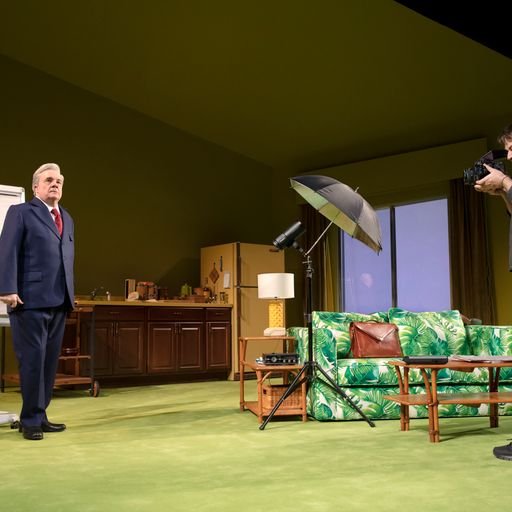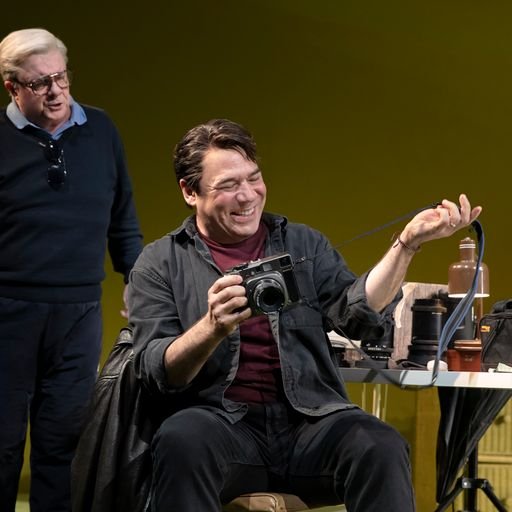My Quick Take Broadway Review: 'Pictures From Home"
The show: “Pictures from Home” by Sharr White (“The Other Place.,” “The Snow Geese” and the Netflix limited series “Halston.”
What is it?: A new Broadway play inspired by Larry Sultan’s landmark photographic memoir from 30 years ago, “Pictures from Home”
What makes it special?: Nathan Lane stars with Danny Burstein and Zoë Wanamaker
What’s it about?: Adult son who is a professional photographer undertakes a seemingly never-ending photo project in the late ‘80s documenting his aging parents’ lives and relationships in search of greater truths.
Does he find them?: Well, truth is a matter of perspective.. It all depends on whose lens you’re looking through and that’s the interesting thing about this play directed by Bartlett Sher, (“To Kill a Mockingbird bird,” “Light in the Piazza,” “My Fair Lady.” )
Sounds picture perfect: Yes and no. Overall, I have mixed feelings about the play. For starters it’s not perfectly cast, with Burstein registering older than what the role really demands, despite wigs for both he and Lane (to make the latter look older). Burstein is one of my favorite actors and is fine in the role but casting a younger actor would have changed the dynamic for the better.
So not so perfect picture . I know the play and the production received mixed reviews (at best) from others and indeed it is far from a perfect play and production. Some of the staging is off, and even clunky; the use of audience address isn’t always effective (and a bit of a cheat); there’s a touch of audience pandering; and the play often goes in and out of focus thematically. Also the play becomes shamelessly sentimental in the end,.
But I found myself talking about the ideas of this play more than others that I’ve seen recently. Are the scholarly interpretations of these famous photographs profound or baloney? Do the pictures capture a moment when the masks slip or is it an artifice on an artifice, a manipulated moment when one doesn’t know what to believe.
It all sounds interesting. Correct. Which is why I was never for a moment bored, though I did a few eye rolls along the way, The play explores the themes of American success, identity and parent/child relationships, especially in the generations at mid-century and after. And our alliances shift with each scen,, especially when paired with the projections of Sultan’s original enigmatic photographs that often give support — but also give lie — to the conversations on stage.
As the proud and prickly father and husband, Lane brings a bravado that dances between comedy and drama— and BTW, who on any stage is such a master of both better than Lane? There may be a few moments where the laughs perhaps come a bit too easily but it’s also a way to make this distant , cool and dogmatic father figure more assessible. Burstein brings his innate likability topthe role that as written in damn annoying, and self-indulgent. (Hmmm. It’s easy to see why he was cast after all.) Perhaps easily overlooked until her final scenes is the assured performances Wannamaker as Sultan’s mother. She beautifully underplays what could easily be a stereotype and finds the real in the underwritten character’’s reality.
Who will like it?: Photo buffs, Lane fans (count me in), and lovers of plays that give you something to talk about after the curtain comes down.
Who won’t?: Those expecting a more focused play and production. Perhaps an out of town or regional tryout would have helped things.
For the kids?: Only if by “kids” you mean analytical offspring that haven’t been to therapy. Otherwise, not really.
Thoughts on leaving the parking lot: It was such and interesting week with seeing this play and the very disappointing “The Wanderers,” two flawed plays about the relationships between parents and their offspring and their searches for identity. It also occurred to me with Lane’s character as a faithful hardworking businessman who invests ions the American Dream only to be discarded by his company that this might be a warm-up for his “Death of a Salesman.” Being floored by his “The Iceman Cometh” and “Butley,” one can hope.




